The inconvenient truth about wealth inequality
Hi Steemians, I was thinking to write another math story but it seems that today's topic is more suited for an article-type blog post. Don't be worried about complicated equations there are none. It should be an easy ready for everyone! So there is no excuse not to read it. In addition, there are pretty gifs!
Today I want to use math to present a phenomenon which almost everybody has come across:
Wealth inequality
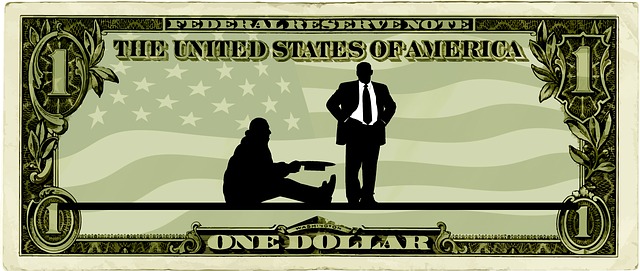
Wealth inequality is in itself not very surprising since people are not equal. So you expect that there are people who are better at making money than others which results in wealth inequality. However, wealth inequality goes hand in hand with the following
Inequality observation: a small percentage of the richest population controls an extremely large percentage of the total wealth.
I think most of us have experienced this at a local level. This observation is the reason why there are only few kids with rich parents in your school/university. It is also why in an air-plane there are so many people in second class compared to first class.
The inequality observation is true in many hierarchical systems all over the world. Consequently, it is a popular universal topic in political debates. Unfortunately, when I hear politicians discuss wealth inequality they fail at pointing out the root of the problem. The left-wing groups say that the evil big banks and large corporations rob the poor and the right-wing groups say that the poor are poor because they are unmotivated and uncompetitive. Both of these explanations pertain to human psychology. More specifically, left-wing groups blame human greed and right-wing groups blame human laziness. Who is right? Of course both could be valid causes and I suspect that both of them affect wealth inequality. But are these causes the root of the problem?
Let us suppose that we could fix the human psyche by removing greed and laziness does this imply that wealth inequality becomes a problem of the past? Let's construct a mathematical model for this case!
A simple wealth model
If you are not keen on modelling feel free to skip this section and continue with the simulation section.
In the real word there are many variables to take into account. However, our aim will not be to model the real world but to capture the crucial aspects which drive the extreme inequality.
So for our model let us take a group of 1000 people. I want to start from a state of pure equality. So I am going to give everyone the same starting wealth: 100 dollars.
How are we going to model the evolution of their wealth? A lot of events in life are random so I want to take a random approach to modelling the wealth evolution of each individual. I also want to take into account the effect that rich people are differently affected by the randomness of life than the poor. In an informal sense, the more money you have the more money you can loose. To clarify this let's treat an example: suppose the house market crashes then your wealth (in an absolute sense) will take a much greater hit if you would live in a mansion than if you would live in a tiny shed. This is of course a great simplification of the real world but we are using a broad brush to create our mathematical model. So I will model the wealth evolution using the following rule:
Wealth evolution rule. Let the percentage change of wealth per week of a single individual be given by a random number between 50 and 150.
So wealth can both decrease and increase. This wealth evolution rule completes our model. Hence, we are ready to run the simulation.
The wealth inequality simulation
Before you check out the gif below you first need to think about what the simulation will display. On the x-axis I will put our test group of 1000 people. Every week I will order these from richest to poorest (number 1 being the richest). You might expect that I will put the wealth of person x on the y axis but it turns out that this gives bad pictures since wealth can change greatly over time. So I will put relative wealth to the richest person on the y-axis which is the wealth of person x divided by the richest person. So person 1 will have relative wealth 1 because person 1 is the richest person. Now you can watch the gif:
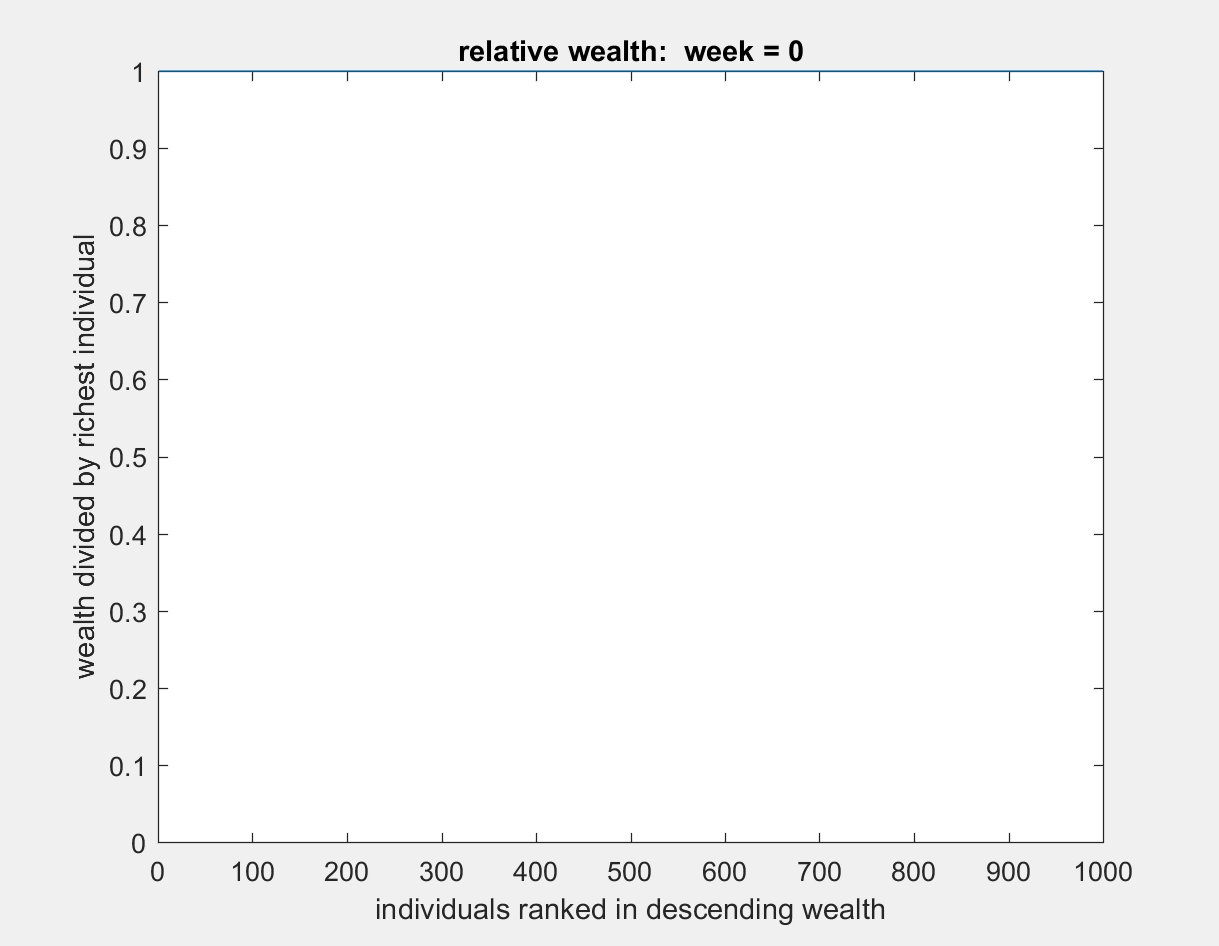
The simulations seem to suggest that after many weeks a great inequality in wealth arises. To get a clearer understanding of who controls the total wealth it is helpful to compute how many of the richest people control most of the total wealth. Of course we need to specify what most means. I will let most mean 80% of the total wealth. I made another program just for this:
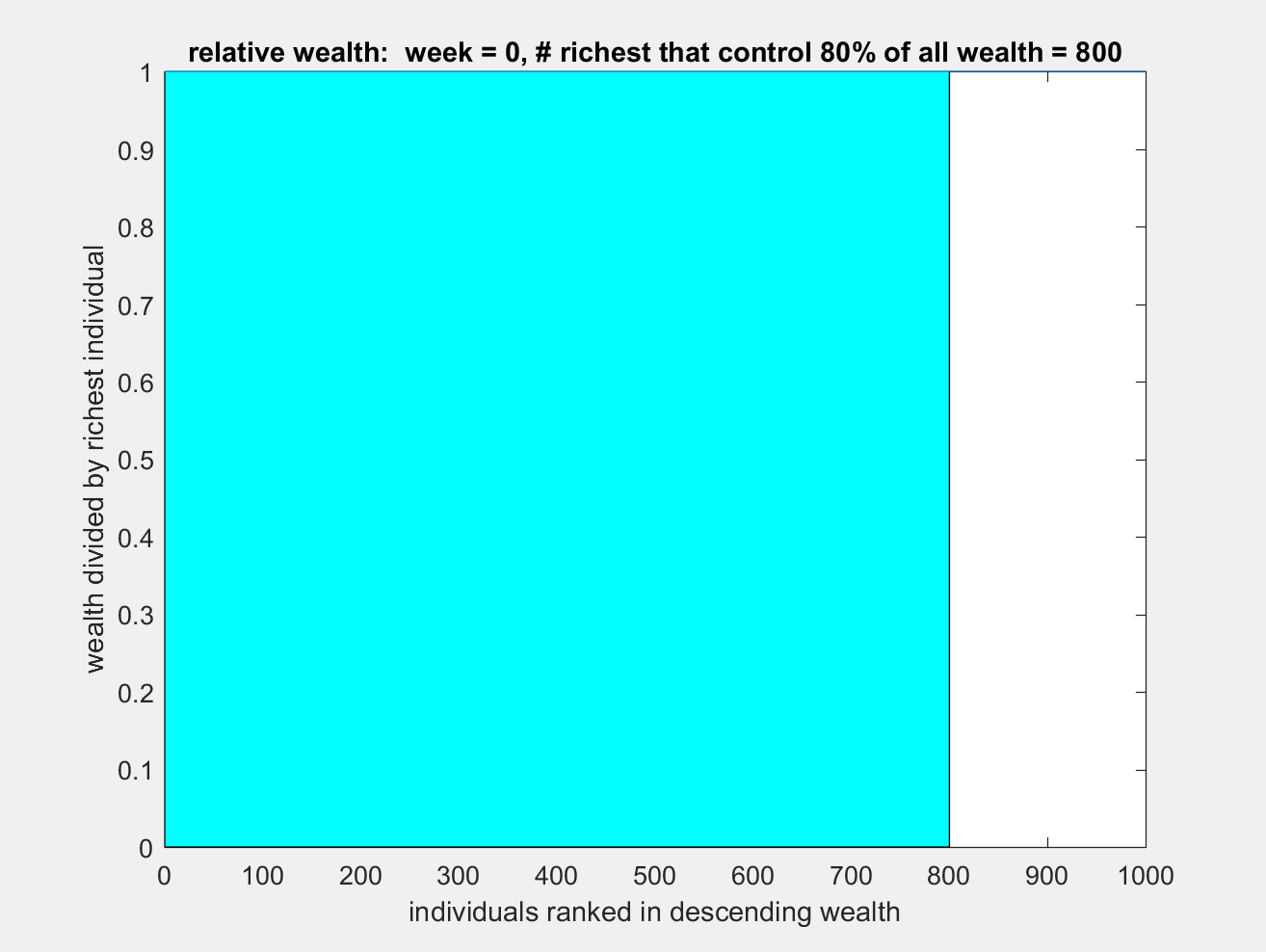
So the cyan domain indicates the domain of the people that control 80% of the total wealth.
Now we clearly see the earlier inequality observation. Only a few people control almost all the wealth.
Fighting wealth inequality
What can we do against this extreme inequality? Let's introduce tax. Taxing everybody an equal amount of course will not help. We need to tax the rich more to create more equality. I am going to implement the following crude tax law: the 10 richest individuals give half their wealth to the 10 poorest individuals where the poorest receives half of the wealth of the richest and the second poorest receives half the wealth of the second richest etc. So this is really more like a redistribution of wealth law than an actual tax. Here is the simulation:
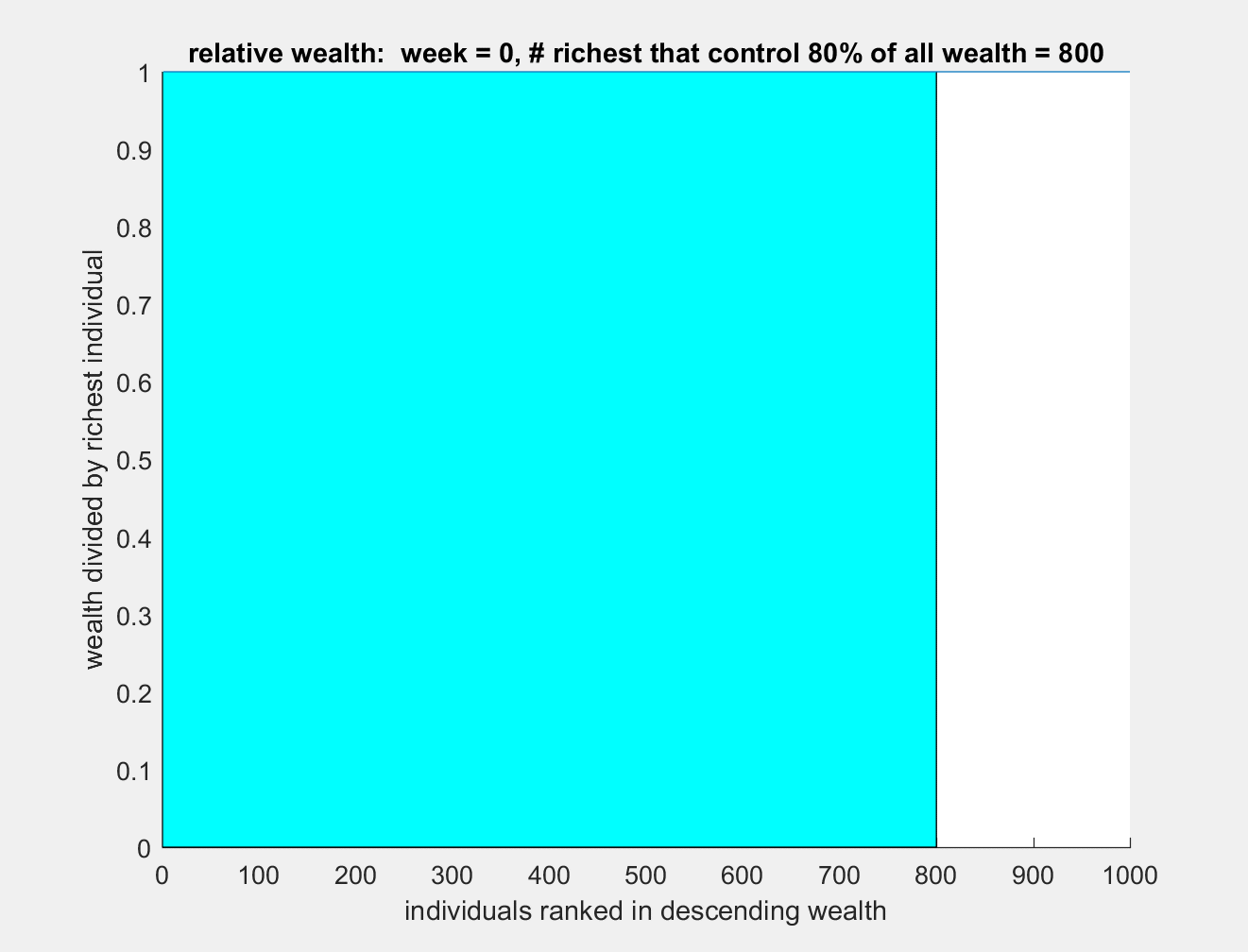
As you can see the total wealth is much better distributed. We can also apply this tax law to the richest 100:
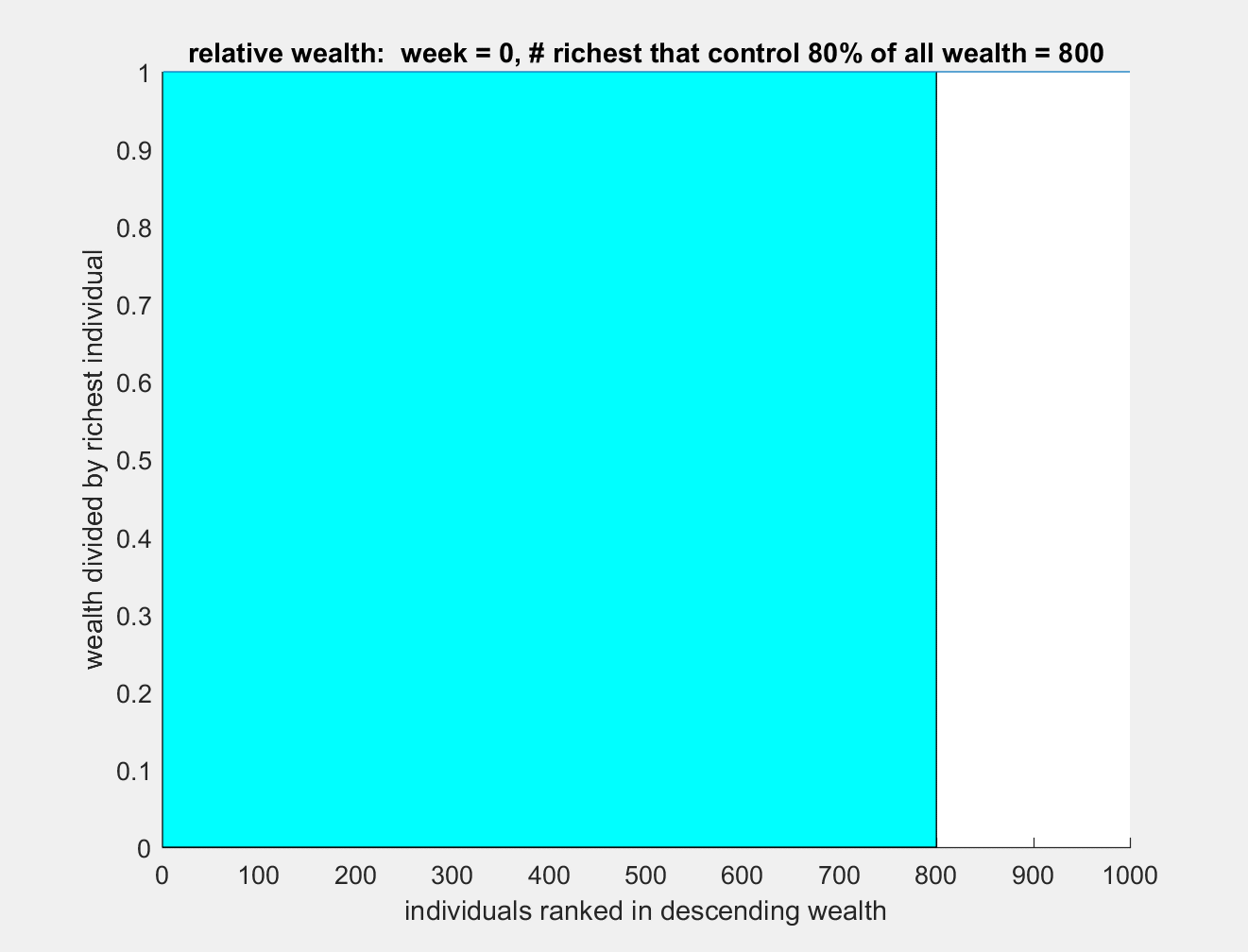
This gives us an even better distribution of wealth.
What can we conclude from this experiment?
In the case that there is no redistribution of wealth this simple model confirms the inequality observation. Since the model does not consider human psychology it gives evidence that wealth inequality naturally arises in society independent of the presence of greed or laziness (assuming that the wealth evolution rule is true). It is gives evidence that wealth inequality is a fact of life. The model does not say if this is a good or bad thing. More generally, the model does not say anything about what the best economical/political system is. So an important problem that remains is how should we deal with extreme inequality. We saw that redistribution of wealth creates more equality but is more equality a good thing or a bad thing?
With a great concentration of wealth an individual can move society forward with his/her vision. However, a great concentration of wealth can also corrupt an individual which leads to practices which can destroy or enslave society. These problems mainly relate to the human psyche/brain. And we humans are not even close in having a good understanding of the human psyche/brain. So lots more of interesting research awaits!
How I got this idea and additional sources
I never learned about the mathematics driving this phenomenon in university. A long time ago I learned about this phenomenon from this non-mathematical video by youtube god zefrank:
So the underlying maths of this post is the Pareto distribution or Power-Law (here is the wiki page if you want to learn more). I very recently came across the Pareto distribution in a video by Prof. Peterson:
(I really like Prof. Peterson but the coin flip example he gives in the video has no relation to the Pareto distribution.) Anyway, I thought it would be cool to write a post about the math governing extreme inequality since it is still a little known fact.
The model and program I created in this post are my own creation. (If you want the code let me know) From a mathematical viewpoint it is a discrete random dynamical system. If you are interested you can check the wiki page (WARNING: only click if you like advanced math).
Top picture by Geralt - Pixabay - CC0 Creative Commons
Owl tax

Photo by Kridsadar Sanyear - Pixabay - CC0 Creative Commons
Join #steemSTEM
If you want to know more come and join us at discord: https://discord.gg/BZXkmWw

CC0 creative commons made by Mathowl, feel free to use this banner :)
Sad truth.
By the way, this paper is interesting. It claims that, in a free market economy, the ideal wealth distribution will be a log-normal one. The author there starts with a fixed wealth for everyone and uses statistical mechanics+game theory to arrive at conclusions.
Why MATLAB this time? Not mathematica. :P
I will give it a read and then maybe write a short follow up post.
Personally, I think that the plot function of Matlab gives prettier pictures. I think in terms of code it is about the same amount of work.
Prettier pictures! Then try matplotlib from python :)
Thanks. I never heard about it. I will give it a try!
This is an owlsome and valuable post! I like how you break down the problem and take away all subjective aspects leaving us with nothing but a 50-150% random fluctuation... and still we end up with the essential problem!
I think this is a relevant thought experiment in so many aspects, especially when we are all coming together on a value creating platform with DPoS-consensus and a "proof-of-brain" reward model...
I'll check out those videos tomorrow, you've made me very curious about what these guys will have to say!
So even if you change the fluctuation you end up with the same thing if you wait long enough.
I am happy that I could make you curious. If you haven't heard about zefrank before don't forget to check his other videos as well. He does a great morgan freeman impression:
Oh zefrank's true facts are effin awesome... my favourite one is probably the chameleon!
This was a great reading mate, congratulations!
I do think inequality is inevitable, simply because every individual takes different choices, and therefore they have different results.
Besides, when it comes to wealth, having a lot of wealth in the first place allows you to earn more wealth later on. So inequality is inevitable. Either way, I think the biggest problem is poverty.
Have you realized how much we like to simulate things about civilization? I mean, you just simulated how wealth would be distributed under certain circumstances, and I know this is totally unrelated but given the fact we like to simulate so many things, that makes me believe even more in the Simulation Theory, do you know it?
Thanks for the kind words :D
Whether poverty is a problem is also a non-trivial question. There seems to be a relation between IQ and income Zagorsky, 2006 is it then a good idea to sustain poor indiviuals with low IQ? Connected to this is that low IQ families get low IQ children Carmargo-Figuera et al., 2014 So how should this be handled?
Being able to simulate the real word gives no evidence that we are living in a simulation. In addition, if we could not simulate the real word then this does not give evidence that we are not living in a simulation since axioms can be imposed by the simulation.
It is really interesting how you managed to get such extreme inequalities with just randomness. I had a lot of fun with reading this post, also with all extra exercises that you implemented :)
I am glad you enjoyed it :D
The evolution operator for this system is given by \phi: x \mapsto a x where a is random number in a specific range. So heuristically it is easy to see that in the limit weeks to infinity (under a suitable scaling) the system behaves like lim_{n \rightarrow \infty} y^n . You also see this in the gifs. (sorry for no rendered latex and all the abuse of notation, I am a bit lazy tonight)
Don't worry about laziness, I read latex as well as I read English (latex is my fifth written language) ;)
Tres bien.
naaa: très bien. You are missing the accent ;)
nice post.
I enjoyed reading this post. I know about the Pareto principle. Is it related to this? like 20% of people have 80% of wealth type?
Also, which type of Pareto distribution does it follow?
With the use of tax what will be the change in probability density function?
1 liners are enough. :D
Down here the distribution depends on the weeks. It is easy to see that for weeks \rightarrow \infty you will end up with the alpha=\infty Pareto distribution. Since the tax is non-uniform the probility function changes when you add tax.
Congratulations! This post has been upvoted from the communal account, @minnowsupport, by MathOwl from the Minnow Support Project. It's a witness project run by aggroed, ausbitbank, teamsteem, theprophet0, someguy123, neoxian, followbtcnews, and netuoso. The goal is to help Steemit grow by supporting Minnows. Please find us at the Peace, Abundance, and Liberty Network (PALnet) Discord Channel. It's a completely public and open space to all members of the Steemit community who voluntarily choose to be there.
If you would like to delegate to the Minnow Support Project you can do so by clicking on the following links: 50SP, 100SP, 250SP, 500SP, 1000SP, 5000SP.
Be sure to leave at least 50SP undelegated on your account.
My opinion will be probably very strange to many people, but I think that rich people are not rich enough.
How many persons you know, by their names from the XIX century? How many of them are known to Wiki? Maybe several hundreds of them.
It will sound harsh, but what was the value of those 1.000.000.000 others?
Today we have the Amazon guy: 120b, Microsoft guy (90b), the Facebook guy (70b) and the Google guys (100b)
-- ### --- ### ---
Grand total is about 400b
Number of people on this planet = 8b
-- ### --- ### ---
Imagine how great it would be to redistribute the wealth to the poorest. Every one of us would get 50$. We could buy 10-15 Steem for that money. Or a decent meal.
But we would lose the things that changed our lives completely and the things that accelerated the humanity (and erased the majority of poverty and created even more wealth).
In the modern world there is a distinction between personal wealth and company wealth. Because the reasons you gave above the company is hardly taxed. This gives rise to the problem who determines if a company is doing good for society and thus gets a great tax reduction.
My starting point is the question: what affects human life in a positive way?
Are those the innovations (IT, tech)?
Health services?
Science, sport, music, creativity in general?
The second question is what products/ services/ "sources of happiness" I can buy with the money and who will provide me those objects of desire?
And the answer seems to be that are are only a handful of individuals capable to provide me that.
Yes, I can get a great kebab from an average man. And it would be really cool to buy free kebabs for the whole town.
But I want some crazy camera instead. And I would be glad to pay 1000 kebabs for it.
And I would be glad to pay 100.000 kebabs for a Ferrari.
Those chosen few allowed us to enjoy the product unimaginable only 10 years ago. And to admire them as the heroes, to get the inspiration to succeed.
Keeping that in mind I have no problem with Google/Roche/Ferrari and their top people with crazy salaries.
Then I guess you probably want to buy this -> https://imgur.com/gallery/TptQAQU
Wow, lots of great information and cool gifs. Great article for sure. Unfortunately the richest 100 people own everything, including senators and congressman, the very people who would have to make this happen. :/
Wow. This shed some light to concepts new to me.
Also, i like how u presented it with graphs. Upvoted and followed. Ill keep an eye of ur next posts.
Thankies :D
This is probably the main issue between leftists, the right and libertarians.
I doubt, that there will ever be a satisfying conclusion to this debate. It largely depends on one's individual moral view. There is no objective truth to it. I would argue, because there is no way to solve the issue, we should not even try it.
I think the answer is given by a full understanding of the human psyche.